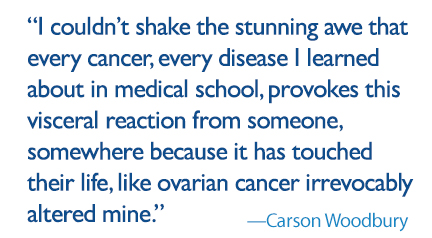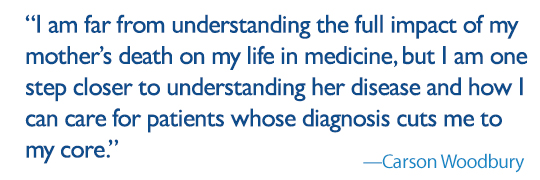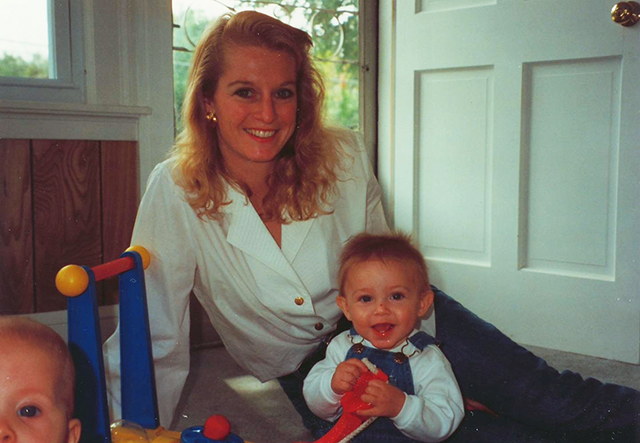No one prepares you for listening to a lecture about how your mother died. Medical students are trained to recognize grief and distress in patients and invite them to talk about it. We are taught the complex molecular physiology behind diseases common and rare, minor and terminal. But we are not trained to see our own family’s tragedy writ large on a lecture screen, broken down into bullet points and illustrated with surgical images.
For me, this moment came on a chilly January morning in the third week of our reproductive systems course. The schedule listed two lectures on ovarian disorders: the first on benign diseases, like cysts and infections, and the second on cancer.
At the end of the first hour, the professor introduced a case example. The patient was a woman in her early 30s with three months of mild abdominal pain. As we worked through the history, lab values and imaging, it became clear: This was no infection or benign cyst. This young woman had ovarian cancer. The lecturer went on to describe the chosen treatment plan, but I barely heard. My mind had been yanked 22 years away, paralyzed with the sudden reminder of another young woman’s cruel diagnosis: my mother’s. A board-certified anesthesiologist, marathon runner and mother to two boys, she died from an aggressive ovarian cancer on May 1, 1995. She was 34.
I heard the class applaud. My friend Eva, who knew about my mom, leaned over and asked me how I was doing. Looking at my computer, I thanked her for asking and mumbled something about the last case being a doozy. I had a minute or two before the second lecture began. I’m still doing okay, I thought. I can still do this. I desperately wanted to understand this disease. But the more I thought about it, the sadder I became. I can’t do this, not now.
Not wanting to make a scene, I grabbed only my laptop and left the hall, focusing on walking at a normal pace. Then, I found a study room with no windows, slumped against the wall and let down my guard.
It was seven days before I finally willed myself to watch the recording of the lecture. It fit the familiar pattern of a cancer talk — risk factors, clinical features, pathology, etc. — but this time sprinkled with pieces of information that jabbed into my stomach like ice picks.
May not feel mass on pelvic exam until >8 cm.
My dad once said my mom’s tumor looked like the Death Star on her CT scan.
An intraoperative photograph showing an abdominal cavity littered with yellowish lobes of metastatic cancer.
 Picturing my mother’s youthful cream-white skin cut with a scalpel and lifted up by cold steel retractors to reveal disease scattered far from its ovarian origin.
Picturing my mother’s youthful cream-white skin cut with a scalpel and lifted up by cold steel retractors to reveal disease scattered far from its ovarian origin.
No overall survival advantage for CA-125 screening in average- risk women.
We still don’t have a way to catch it early.
All the while, I couldn’t shake the stunning awe that every cancer, every disease I learned about in medical school, provokes this visceral reaction from someone, somewhere because it has touched their life, like ovarian cancer irrevocably altered mine. How many of my classmates, I wondered, who didn’t attend a particular lecture had excused themselves because they were too sad, because the featured disease had once scarred their family? How will we fare caring for our first patients suffering from diseases we could name before we could spell “surgeon”?
Illness touches all of us. New medical students are not blank slates. We arrive carrying the weight of our family’s collective experience with health and the medical system. I am far from understanding the full impact of my mother’s death on my life in medicine, but I am one step closer to understanding her disease and how I can care for patients whose diagnosis cuts me to my core.
 Ovarian cancer has a face and a name and a story for me. Ovarian cancer will forever be represented by my mother. But there are countless more diseases for which I don’t have a story. In a few weeks, my classmates and I will enter the hospital to begin learning the human stories with which to illustrate our textbooks. Faces will replace PowerPoint slides. Conversations will supplant bulleted lists. A slice from a CT scan will lose its abstractness and become a window into understanding Ms. F’s bloody cough. Disease will gain a face and a name and a favorite takeout dinner. Disease will become human. And then we’ll go to work.
Ovarian cancer has a face and a name and a story for me. Ovarian cancer will forever be represented by my mother. But there are countless more diseases for which I don’t have a story. In a few weeks, my classmates and I will enter the hospital to begin learning the human stories with which to illustrate our textbooks. Faces will replace PowerPoint slides. Conversations will supplant bulleted lists. A slice from a CT scan will lose its abstractness and become a window into understanding Ms. F’s bloody cough. Disease will gain a face and a name and a favorite takeout dinner. Disease will become human. And then we’ll go to work.
Related Content
- Compassion in Eight Stitches: Carson Woodbury grapples with learning to cut and sew a human body without losing sight of the person under the knife?
- The Anatomy of Being Human: Pranjal Gupta tackles the scientific and human aspects of his Human Anatomy course.
- An Unexpected Death: Ruchi Doshi learns that medicine isn’t just pure science.

Thanks for writing this with your usual eloquence, Carson.
I, too, have a personal experience with illness in my family, and it has informed me for over a decade by this point. Indeed, disease is human.
- Adela
Thank you for writing this. I do cancer research and picked it because I had close family members who were diagnosed and died while I've been in graduate school. I still feel raw when reading about new trials for breast cancer since my sister couldn't join any of them. But at the same time, I'm so grateful for others work because as much as I want to be apart of the cure, we need the cure now; others are fighting for their lives everyday.
Carson, thank you for your courage in sharing such a deeply personal experience. Your words certainly resonate with many of us and remind us all of the important work that awaits.
Carson, I remember you from your starring role in a small independent film. Glad to see you are taking a monumental loss and using it for good. I remember Kate, and miss her very much. My best to you and your father.
Carson, you are full of your mom's compassion and scientific curiosity--and putting these gifts to great use. XO and Love, Aunt Julie
Carson: Beautifully expressed I am proud to say that I have watched you grow into a man of extraordinary intelligence, sensitivity, and compassion. You will make such a fine physician.
Carson, So beautifully written, but even more from the heart and soul. Not easy to do. You are an incredible young man, full of feeling and life. You are a gift to medicine and all of us who know you and love you. So proud of you
Lee
Carson, This article is very touching and it helps to know that a doctor has compassion such as yours. My cousin died of ovarian cancer some years ago and I know of someone else in my family who has been diagnosed at a young age. Keep doing what you do because it helps others to know that they are not alone.
Well written. I'm sorry for your loss. From reading your story I feel that you will bring a strong dose of empathy to all your patients. Good luck in all you do!
Thanks for sharing, Carson!
I too lost my mother. She was 32 & I was 6. I am a nurse who tries to provide empathetic care to everyone. This will make you a better doc, and this is a gift from your mom.
Carson,
Your eloquent piece touched me. Thank you for reminding us all that there is always a person behind every test, procedure, diagnosis, and lecture.
Comments are closed.